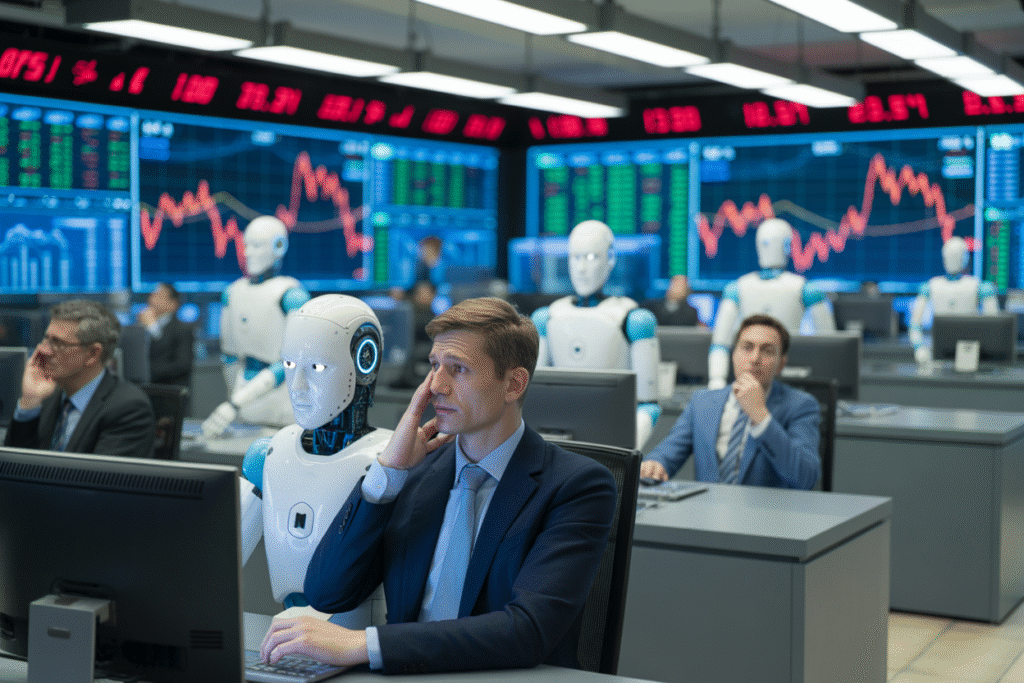AI replacing humans is no longer hype—it’s here, sparking fierce debates on jobs, ethics, and the future of work.
AI replacing humans isn’t a sci-fi trailer anymore—it’s the morning news. From chatbots handling customer service to algorithms scanning résumés, the shift is happening faster than most of us expected. In just the last three hours, social feeds lit up with warnings, manifestos, and hot takes about what this means for jobs, ethics, and society itself. If you’ve felt a knot in your stomach while reading headlines about AI job displacement, you’re not alone. Let’s unpack the noise and look at what’s really at stake.
The Shockwave Hits
AI replacing humans isn’t a sci-fi trailer anymore—it’s the morning news. From chatbots handling customer service to algorithms scanning résumés, the shift is happening faster than most of us expected. In just the last three hours, social feeds lit up with warnings, manifestos, and hot takes about what this means for jobs, ethics, and society itself. If you’ve felt a knot in your stomach while reading headlines about AI job displacement, you’re not alone. Let’s unpack the noise and look at what’s really at stake.
Profit Versus People
Melanie D’Arrigo, Executive Director of the New York Housing Campaign, fired off a viral post calling the current AI gold rush “tech broliarchy.” Her argument is simple: swapping people for code isn’t innovation if the only winner is the bottom line. She paints a picture of retail clerks and admin assistants booted overnight, funneled into gig work that barely covers rent. Meanwhile, deregulation fans cheer cost savings, ignoring the safety nets that haven’t been built yet.
The post sparked a firefight in the replies. Tech CEOs claim new roles will magically appear, just like they did after the Industrial Revolution. Labor unions counter with spreadsheets showing net job loss and widening inequality. The debate boils down to one question: who captures the value when AI replacing humans becomes standard practice? If the answer is shareholders alone, D’Arrigo warns we’re courting social unrest on a scale we haven’t seen in decades.
When the Grid Buckles
ZeroHedge, never shy about doomsday headlines, predicts a modern Luddite uprising. Their scenario: entry-level jobs vanish, electricity prices spike to feed data centers, and graduates face a barren job market. The result? Protesters torching server farms within a year, echoing 19th-century weavers smashing mechanical looms. It’s dramatic, but the underlying math is hard to ignore—AI systems now consume as much energy as small nations, and someone has to foot the bill.
The post forces us to weigh two futures. In one, AI job displacement drives explosive productivity and wealth, ushering in an era of universal basic income and creative liberation. In the other, energy grids buckle, unemployment soars, and anger crystallizes into violence. Which path feels more realistic right now? If you’re leaning toward the darker timeline, you’re not cynical—you’re paying attention.
Blueprint for a Human Future
Faruk Guney, a tech founder turned ethicist, argues we’re living through a historical rupture as seismic as the atom bomb. He coins the term “algorithmic sovereigns” to describe corporations that accumulate god-like power over data, culture, and even political narratives. Guney’s manifesto isn’t all gloom; he offers a five-point rescue plan:
– Algorithmic dividends so citizens share in AI profits
– Universal basic services, not just cash handouts
– Aggressive antitrust to break up data monopolies
– A global AI audit agency with real enforcement teeth
– A moral framework inspired by philosopher John Rawls
Each bullet is designed to keep human dignity at the center of the AI replacing humans debate. Guney’s core insight: technology is never neutral. It either amplifies existing power imbalances or corrects them. The choice is ours, but the clock is ticking.
Guarding the Guardians
The American National Standards Institute dropped a quieter but equally chilling stat: 78% of companies are already using AI, yet most lack ethical guardrails. Their post lists four red flags every business should watch:
1. Bias amplification in hiring and lending algorithms
2. Job displacement without retraining programs
3. Misinformation campaigns powered by generative text
4. Privacy breaches from unchecked data harvesting
The takeaway? AI risks aren’t theoretical—they’re baked into today’s workflows. Joveo, an AI-powered recruiting platform, responded with a guide urging HR teams to audit their tools quarterly. Their advice is refreshingly practical: pair every AI recommendation with human oversight, publish transparency reports, and invite third-party audits. If businesses treat ethics as a feature instead of a footnote, AI job displacement could become an opportunity to redesign work rather than a threat to it.


